人教版五年级下册英语知识点整理知识讲解
小学英语人教版PEP五年级下册1-6单元知识点总结

Unit1 My day一、基本句型1.询问什么时候做某事:- When do you ……?你什么时候……?- I usually…at …. 我通常在…(点钟)…。
例:-When do you eat breakfast?-I eat breakfast at 7:00.2.What do you do on the weekend?你周末做什么?- I +频率副词+周末活动+时间。
或Sometimes I+周末活动例句:I sometimes go shopping with my mum on the weekend.(周末我时候和妈妈一起去购物)二、知识点:1.频率副词:always(总是,一直)>usually(通常)>often(经常)>sometimes(有时)2.只有Sometimes可以放在句首。
(Sometimes I cook dinner.)3.On the weekend 在周末on Saturdays 在周六on Sundays在周日(别忘加s)Unit2 My favourite season1.-Which season do you like best? (你最喜欢哪个季节?)Why?(为什么)-I like +季节+ best.(I like spring∕summer∕fall∕winter best) Because ___________.(因为)或:-What‘s your favourite season? -My favourite season is spring∕summer∕fall∕winter.2.-Why do you like winter best?(你为什么最喜欢冬天?) -Because______.二、知识点:1.leaf(树叶):复数leaves2.W,W真神奇,问出许多大问题。
what,what,问“什么”,when,when,问“时间”,where,where,问“哪里”,which,which,“哪一个”,why,why,“为什么”.Unit3 My school calendar补充:1.Dragon Boat Festival 龙舟节或端午节(农历五月五日)一般在阳历6月2.月份首字母大写。
五年级英语下册重要知识点汇总
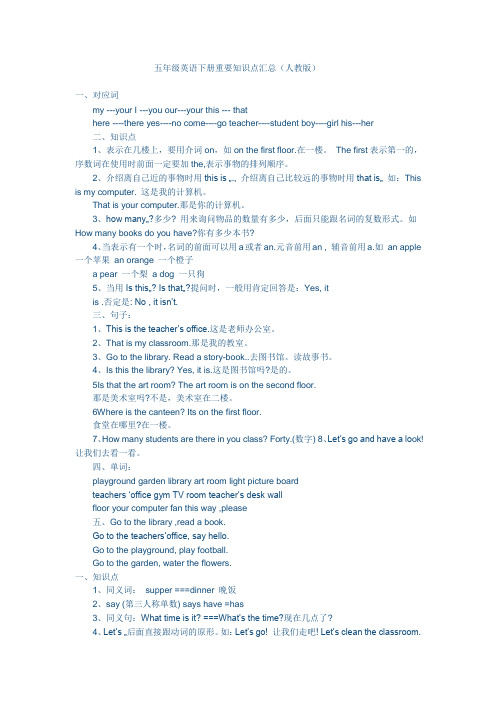
五年级英语下册重要知识点汇总(人教版)一、对应词my ---your I ---you our---your this --- thathere ----there yes----no come----go teacher----student boy----girl his---her二、知识点1、表示在几楼上,要用介词on,如on the first floor.在一楼。
The first表示第一的,序数词在使用时前面一定要加the,表示事物的排列顺序。
2、介绍离自己近的事物时用this is …., 介绍离自己比较远的事物时用that is… 如:This is my computer. 这是我的计算机。
That is your computer.那是你的计算机。
3、how many…?多少? 用来询问物品的数量有多少,后面只能跟名词的复数形式。
如How many books do you have?你有多少本书?4、当表示有一个时,名词的前面可以用a或者an.元音前用an , 辅音前用a.如an apple 一个苹果an orange 一个橙子a pear 一个梨a dog 一只狗5、当用Is this…? Is that…?提问时,一般用肯定回答是:Yes, itis .否定是: No , it isn’t.三、句子:1、This is the teacher’s office.这是老师办公室。
2、That is my classroom.那是我的教室。
3、Go to the library. Read a story-book..去图书馆。
读故事书。
4、Is this the library? Yes, it is.这是图书馆吗?是的。
5Is that the art room? The art room is on the second floor.那是美术室吗?不是,美术室在二楼。
人教版小学五年级下册英语知识点整理
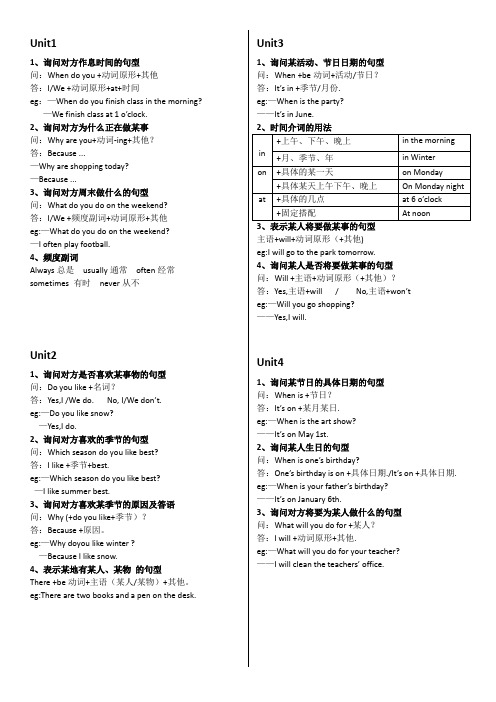
Unit11、询问对方作息时间的句型问:When do you +动词原形+其他答:I/We +动词原形+at+时间eg:—When do you finish class in the morning?—We finish class at 1 o’clock.2、询问对方为什么正在做某事问:Why are you+动词-ing+其他?答:Because ...—Why are shopping today?—Because ...3、询问对方周末做什么的句型问:What do you do on the weekend?答:I/We +频度副词+动词原形+其他eg:—What do you do on the weekend?—I often play football.4、频度副词Always总是usually通常often经常sometimes 有时never从不Unit21、询问对方是否喜欢某事物的句型问:Do you like +名词?答:Yes,I /We do. No, I/We don’t. eg:—Do you like snow?—Yes,I do.2、询问对方喜欢的季节的句型问:Which season do you like best?答:I like +季节+best.eg:—Which season do you like best?—I like summer best.3、询问对方喜欢某季节的原因及答语问:Why (+do you like+季节)?答:Because +原因。
eg:—Why doyou like winter ?—Because I like snow.4、表示某地有某人、某物的句型There +be动词+主语(某人/某物)+其他。
eg:There are two books and a pen on the desk.Unit31、询问某活动、节日日期的句型问:When +be动词+活动/节日?答:It’s in +季节/月份.eg:—When is the party?——It’s in June.主语+will+动词原形(+其他)eg:I will go to the park tomorrow.4、询问某人是否将要做某事的句型问:Will +主语+动词原形(+其他)?答:Yes,主语+will / No,主语+won’t eg:—Will you go shopping?——Yes,I will.Unit41、询问某节日的具体日期的句型问:When is +节日?答:It’s on +某月某日.eg:—When is the art show?——It’s on May 1st.2、询问某人生日的句型问:When is one’s birthday?答:One’s birthday is on +具体日期./It’s on +具体日期. eg:—When is your father’s birthday?——It’s on January 6th.3、询问对方将要为某人做什么的句型问:What will you do for +某人?答:I will +动词原形+其他.eg:—What will you do for your teacher?——I will clean the teachers’ office.1、描述物品归属的句型物品+ be动词(is/are)+(mine/his/hers/yours/ours/theirs) eg:The book is yours.2、确认物品归属地句型问:be动词+this/that/these/those(+其他)+某人的?答:Yes,it is. Yes,they are./ No,it,is’t. No,they aren’t. eg:—Is that crayou his?——Yes,it is.3、询问物品归属的句型问:单数Whose+is it/this/that?复数Whose+are they/these/those?答:It’s/They’re+名词性物主代词/ 名词所有格eg:—Whose bag is this?——It’s mine.4、现在进行时的一般疑问句问:Be动词+主语+动词-ing(+其他)?答:Yes,主语+be动词/ No,主语+be动词+not. eg:—Is she listening to music?——Yes,she is.5、描述某人正在做某事主语+be动词(am/is/are)+动词-ing(+其他).eg:I’m doing my homework now.6、询问某人能否做某事问:Can+主语+动词原形+其他?答:Yes,主语+can. /No,主语+can’t.eg:—Can I play football?——Yes,you can.Unit61、询问多个人或动物正在做什么的句型问:What are +主语(复数)+doing?答:主语(复数)+are+动词-ing+其他.eg:—What are the boys doing?——They are jumping2、询问单个人或动物正在做什么的句型问:What is +主语(单数)+doing?答:主语(单数)+is+动词-ing+其他.eg:—What is Tom doing?——He is playing football.。
(完整版)人教版五年级英语下册Unit1知识点汇总

Unit1 My day 知识整理△话题:谈论每天的活动及时间安排△词汇:do morning exercises(做早操)eat breakfast/lunch/dinner(吃早餐/午餐/晚餐)have...class(上…课),play sports(做运动)clean my room(打扫我的房间),go for a walk (散步) go shopping(购物),take a dancing class(上舞蹈课)△拓展词汇:get up(起床), go to bed(上床睡觉)wash my clothes(洗我的衣服), watch TV(看电视)do homework(做作业), play music(演奏音乐)cook dinner(煮晚餐), at home(在家)in the morning(在上午),in the afternoon(在下午)in the evening(在晚上),at night(在半夜)△句型:①询问做某事在几点When do you+动词原形(短语)+其他?—— At +时间—— I(+频度副词)+动词原形(短语)+at+时间。
例句:When do you get up in the morning?—— At 7:30.—— I often get up at 7:30.②询问周末的活动安排What do you often do on the weekend?I often (always/sometime/usually) +…(周末的活动)+with … (某人)+on the weekend (on Saturdays/on Sundays ).例句:What do you do on the weekend ?I often take a dancing class with my friend on Sundays. △知识点:1:注意介词的搭配at +具体时间(几点)/night/home at 9 o ’clock in +国家/季节 in Spainon +星期 on the weekend/on Sundays with +人 with my father/mother/friend 2:表示时间频率词的区别always 表示总是,一直;usually 表示经常,通常;often 表示经常,常常;sometimes 表示有时,间或。
完整版)人教版五年级下册英语知识点整理
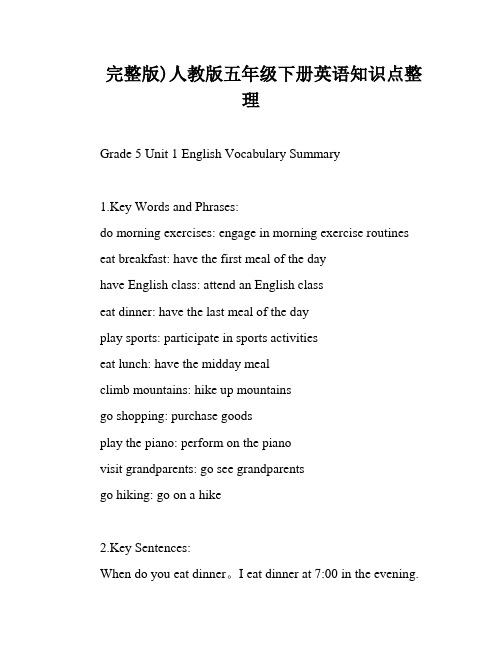
完整版)人教版五年级下册英语知识点整理Grade 5 Unit 1 English Vocabulary Summary1.Key Words and Phrases:do morning exercises: engage in morning exercise routines eat breakfast: have the first meal of the dayhave English class: attend an English classeat dinner: have the last meal of the dayplay sports: participate in sports activitieseat lunch: have the midday mealclimb mountains: hike up mountainsgo shopping: purchase goodsplay the piano: perform on the pianovisit grandparents: go see grandparentsgo hiking: go on a hike2.Key Sentences:When do you eat dinner。
I eat dinner at 7:00 in the evening.When do you get up。
I usually get up at 12:00 at noon.What do you do on the weekend。
Usually。
I watch TV and go shopping。
Sometimes。
I go hiking.I often play football.3.Important Points:Synonyms: eat breakfast - have breakfast。
eat lunch - have lunch。
人教版英语五年级下册知识点1-3单元
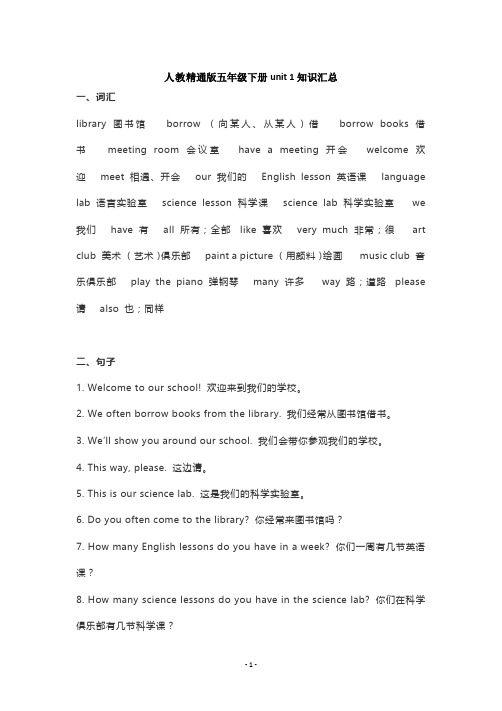
人教精通版五年级下册unit 1 知识汇总一、词汇library 图书馆 borrow (向某人、从某人)借 borrow books 借书 meeting room 会议室have a meeting 开会welcome 欢迎meet 相遇、开会our 我们的English lesson 英语课language lab 语言实验室science lesson 科学课science lab 科学实验室 we 我们have 有all 所有;全部 like 喜欢very much 非常;很 art club 美术(艺术)俱乐部paint a picture (用颜料)绘画 music club 音乐俱乐部play the piano 弹钢琴many 许多 way 路;道路 please 请also 也;同样二、句子1. Welcome to our school! 欢迎来到我们的学校。
2. We often borrow books from the library. 我们经常从图书馆借书。
3. We’ll show you around our school. 我们会带你参观我们的学校。
4. This way, please. 这边请。
5. This is our science lab. 这是我们的科学实验室。
6. Do you often come to the library? 你经常来图书馆吗?7. How many English lessons do you have in a week? 你们一周有几节英语课?8. How many science lessons do you have in the science lab? 你们在科学俱乐部有几节科学课?9. We have one science lesson in the science lab.我们在科学俱乐部有一节科学课。
人教版五年级英语下册随堂整理笔记
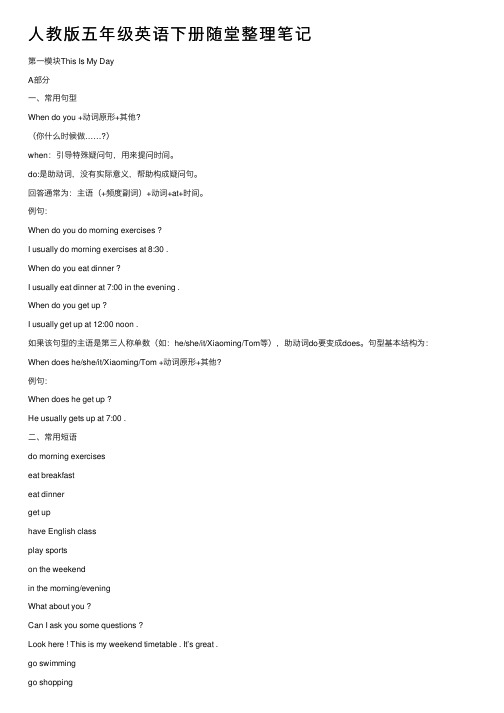
⼈教版五年级英语下册随堂整理笔记第⼀模块This Is My DayA部分⼀、常⽤句型When do you +动词原形+其他?(你什么时候做……?)when:引导特殊疑问句,⽤来提问时间。
do:是助动词,没有实际意义,帮助构成疑问句。
回答通常为:主语(+频度副词)+动词+at+时间。
例句:When do you do morning exercises ?I usually do morning exercises at 8:30 .When do you eat dinner ?I usually eat dinner at 7:00 in the evening .When do you get up ?I usually get up at 12:00 noon .如果该句型的主语是第三⼈称单数(如:he/she/it/Xiaoming/Tom等),助动词do要变成does。
句型基本结构为:When does he/she/it/Xiaoming/Tom +动词原形+其他?例句:When does he get up ?He usually gets up at 7:00 .⼆、常⽤短语do morning exerciseseat breakfasteat dinnerget uphave English classplay sportson the weekendin the morning/eveningWhat about you ?Can I ask you some questions ?Look here ! This is my weekend timetable . It’s great .go to schoolgo to workgo to bedgo homeexcuse meI am sorry.Sometimes I climb mountains .play the pianovisit grandparentswatch videosWhat do you do ?Tell us about your day !Thank you for telling me about your day .You’re welcome .三、单词when usually often at about too day ask work evening noon tell policeman some sure四、⼀般现在时⼀般现在时表⽰现在经常发⽣的动作、⾏为或存在的状态等。
人教版PEP小学英语五年级下册知识点汇总(最新)
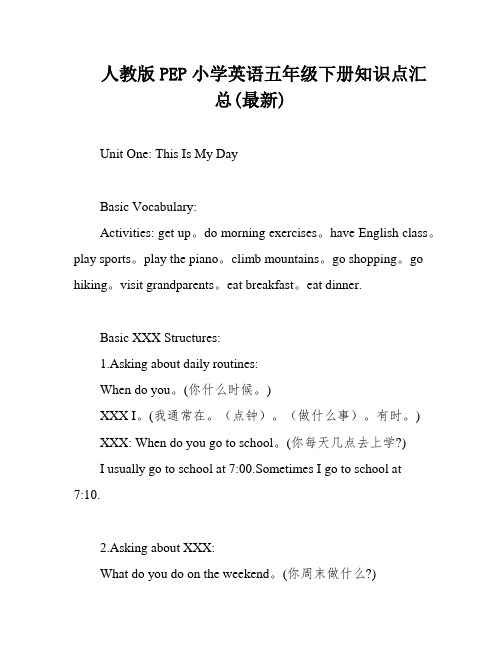
人教版PEP小学英语五年级下册知识点汇总(最新)Unit One: This Is My DayBasic Vocabulary:Activities: get up。
do morning exercises。
have English class。
play sports。
play the piano。
climb mountains。
go shopping。
go hiking。
visit grandparents。
eat breakfast。
eat dinner.Basic XXX Structures:1.Asking about daily routines:When do you。
(你什么时候。
)XXX I。
(我通常在。
(点钟)。
(做什么事)。
有时。
)XXX: When do you go to school。
(你每天几点去上学?)I usually go to school at 7:00.Sometimes I go to school at7:10.2.Asking about XXX:What do you do on the weekend。
(你周末做什么?)XXX I。
(我通常/经常。
有时。
)XXX: What do you do on the weekend?I often play XXX I go shopping with my mom.3.Introducing one's own habits:Every weekend。
I go hiking。
(我每个周末远足。
)Every day。
I do my homework at 8:00 in the evening。
(我每天晚上8点做作业。
)4.Asking XXX:What do you do。
(你是干什么的?)Time:morning。
afternoon。
evening。
noon。
at night。
6:00.on Sunday。
- 1、下载文档前请自行甄别文档内容的完整性,平台不提供额外的编辑、内容补充、找答案等附加服务。
- 2、"仅部分预览"的文档,不可在线预览部分如存在完整性等问题,可反馈申请退款(可完整预览的文档不适用该条件!)。
- 3、如文档侵犯您的权益,请联系客服反馈,我们会尽快为您处理(人工客服工作时间:9:00-18:30)。
人教版五年级下册英语知识点整理五年级下册英语第一单元知识点整理1、主要单词和短语:do morning exercises 晨练,做早操eat breakfast 吃早饭have English class 上英语课eat dinner 吃晚饭play sports 进行体育活动eat lunch 吃午饭climb mountains 爬山go shopping 购物,买东西play the piano 弹钢琴visit grandparents 看望(外)祖父母go hiking 去远足二、主要句子:When do you eat dinner? 你什么时候吃晚饭?I eat dinner at 7:00 in the evening. 我晚上七点吃晚饭。
When do you get up? 你什么时候起床?I usually get up at 12:00 at noon. 我通常在中午12点起床。
What do you do on the weekend? 你在周末干什么?Usually I watch TV and go shopping. 我通常看电视和购物。
I often play football. 我经常踢足球。
Sometimes I go hiking. 有时候我去远足。
三、重要知识点同义词:eat breakfast-have breakfast , eat lunch-have lunch, eat dinner-have dinner play sports-do sports, usually-often复数形式:policeman-policemen policewoman-policewomen现在分词:tell-telling第三人称单数:say-says同义句:What do you do ? ---What are you? 你是干什么的?表示频度的副词:always 总是,一直;usually 通常,常常;often 经常;sometimes 有时候以复数形式出现的词组:visit grandparents ,plant trees介词后跟表示时间的词语时,表示在某年、某月、某个季节,某个时候(在上午,在下午,在晚上)用in;表示在某一天,在星期几用on,在具体的几点几分用at.too 和either的用法区别:too和either都是“也”的意思,但too用于肯定句,either用于否定句。
五年级下册英语第二单元知识点整理一、主要单词和短语:season 季节spring 春天summer 夏天fall 秋天winter 冬天swim 游泳fly kites 放风筝skate 滑冰make a snowman 堆雪人plant trees 种树二、主要句子:Which season do you like best? 你最喜欢哪个季节?I like winter best. 我最喜欢冬天。
Summer is good, but fall is my favourite season.夏天是很好,但是秋天是我最喜爱的季节。
Why do you like summer? 你为什么喜欢夏天?Because I can swim in the lake. 因为我可以在湖里游泳。
Why do you like winter? 你为什么喜欢冬天?Because I can sleep a long time. 因为我可以睡很长时间的觉。
三、知识点同义词:autumn-fall(秋天)三单:say-says ask-asks come-comes对应词:wake up-sleep ;go to bed-get up同义句:What's your favourite season?(你最喜欢的季节是什么?)----Which season do you like best?(你最喜欢哪个季节?)play with 玩雪,play in the snow在雪中玩 , 如果在横线后面有the ,则选择in , 如果在横线后面没有the , 则选择 with.like后面不能直接跟动词。
如果需要跟动词或动词性词组时,则需在like后面加to. 如果不加to. 就要把后面的动词变成相应的动名词形式。
如:I like to swim ===I like swimming.当表示某地某个季节的天气情况时,要把季节放在前面,地点放在后面。
其结构为:What's the weather like in 季节in 地点?五年级下册英语第三单元知识点整理一、主要单词:January (Jan.)一月 February (Feb.)二月March (Mar.)三月April(Apr.)四月May 五月June 六月 July 七月 August(Aug.)八月September(Sept.)九月October( Oct.)十月November (Nov.)十一月 December ( Dec.)十二月二、主要句子1. When is your birthday? 你的生日是什么时候 --It's in May. 在五月。
2. My birthday is in June. Uncle Bill's birthday is in June, too. 我的生日在六月。
比尔叔叔的生日也在六月。
3. Is her birthday in June? 她的生日在六月吗? --Yes. 是的。
4.What's the date? 是几月几日? --June 9th . 六月九日。
5. What's the date today? 今天是几月几日? -- It's April 10th. 四月十日。
三、主要知识点:1、关于月份:(1)五月May , 六月June, 七月July,没有简写形式。
九月September 的简写形式是前四个字母加点Sept. 其他八个月的简写形式是前三个字母加点。
(2)无论是完全形式还是简写形式,表示12个月的单词的第一个字母都要大写。
2、关于基数词变序数词。
(1)一般情况下,直接在基数词后面加th. (one , two , three 除外)。
one-first , two-second , three-third .(2)以ve结尾的基数词,变ve为f, 再加th. 如:five-fifth , twelve-twelfth.(3)以t结尾的基数词,直接加h.如eight-eighth.(4)以不发音的字母e结尾的,丢掉不发音的字母e,再加th. 如 nine-ninth.(5)以y结尾的整十数,在变为序数词时,将y变为ie, 再加th. 如twenty-twentieth .(6)20以上的两位数,变为序数词时,十位数不变,只将个位上的数变为序数词。
如:twenty-one----twenty-first , twenty-two-twenty-second , thirty-four-thirty-fourth .(7)序数词的简写形式为表示该词的阿拉伯数字加上该单词的最后两个字母,最后两个字母要变成上标格式。
如:first-1st , second-2nd , third-3rd , fourth-4th . twentieth-20th3. 在回答 When is your birthday? 这个问题时,如果只说明生日在几月份,在月份前用in. 如 My birthday is in July.如果要具体说明生日是在几月几日,则要把in去掉,直接用is,或者在is后加on.如 My birthday is June 9th. 或 My birthday is on June 9th .4.注意区分两个句子:What day is it today ? 今天星期几?What's the date today? 今天是几月几日?5. 根据要求写单词:make (现在分词)---making. send(现在分词)---sending.6.句子:How many birthdays are in October ? 有几个人的生日在十月? There are 3.7. My birthday is in February . (变为一般疑问句)---Is your birthday in February?8. Does she have a computer? 她有计算机吗?当第三人称单数和句子中出现了does时,其他动词必须使用原型。
9、读序数词时,前面一定要加the. 如 October 1st .读作October the first.10、同义句: Who has a birthday in October?===Whose birthday is in October?五年级下册英语第四单元知识点整理一、主要单词:draw pictures 画画drawing pictures 正在画画do the dishes 洗碗碟doing the dishes 正在洗碗碟cook dinner 做饭cooking dinner 正在做饭read a book 读书reading a book 正在读书answer the phone 接电话 answering the phone 正在接电话listen to music 听音乐listening to music 正在听音乐wash clothes 洗衣服washing clothes 正在洗衣clean the room 打扫房间cleaning the room 正在打扫房间write a letter 写信writing a letter 正在写信write an e-mail 写电子邮件 writing an e-mail 正在写电子邮件二、主要句子:1. This is Zhang Peng .(电话用语)我是张朋。
What are you doing? 你正在干什么?2.I'm doing the dishes. 我正在洗碗碟。
I'm reading a book. 我正在读书。
3.Grandpa is writing a letter. 爷爷正在写信。
Brother is doing homework. 弟弟正在做作业。
4.Mom is cooking dinner in the kitchen. 妈妈正在厨房里做饭。
5.Dad is writing an e-mail in the study. 爸爸正在书房里写电子邮件。
